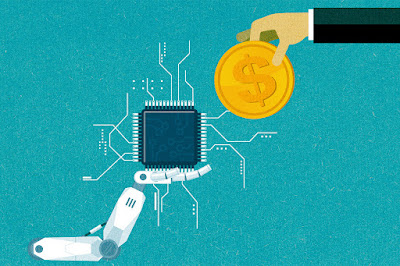Top Nine Impacts of Technology On Wealth Creation - How AI Is Changing How You Create & Manage Wealth
Technology has become a driving force in transforming economies and shaping the landscape of wealth creation. In the modern era, technological advancements have accelerated the pace of innovation, altered industries, and provided new opportunities for individuals to generate wealth. This blog examines the profound impact of technology on wealth creation, exploring how it has revolutionized various sectors and empowered individuals to achieve financial prosperity.
I. Technological Disruption and Innovation: Technology has disrupted traditional industries, revolutionizing the way business is conducted and creating new avenues for wealth creation. Innovations such as the internet, cloud computing, artificial intelligence (AI), and blockchain have reshaped sectors ranging from finance to healthcare, enabling more efficient processes, cost savings, and enhanced productivity. The advent of digital music and streaming platforms, such as Spotify and Apple Music, disrupted the traditional music industry. As CDs and physical sales declined, artists and record labels embraced online distribution, offering music directly to consumers. This democratization of music distribution opened new revenue streams for artists and provided consumers with greater access to music.
2. Entrepreneurship and Startups: Technology has democratized entrepreneurship, making it more accessible for individuals to pursue their business ideas and create wealth. Startups can now leverage technology to reach global markets, attract investors, and scale their ventures rapidly. The rise of incubators, accelerators, and crowdfunding platforms has further facilitated the growth of innovative startups. Uber's emergence revolutionized the transportation industry. By leveraging mobile technology, Uber created a platform connecting riders with drivers, disrupting the taxi industry. This technological innovation empowered individual drivers to become entrepreneurs, earning income on their terms, while passengers enjoyed greater convenience and access to transportation services.
3. E-commerce and Digital Marketplaces: The advent of e-commerce and digital marketplaces has transformed the way goods and services are bought and sold. Online platforms allow individuals to establish their own businesses, reaching a vast customer base without the need for a physical storefront. E-commerce has facilitated direct-to-consumer sales, reducing intermediaries and increasing profit margins for sellers. Amazon's online marketplace transformed e-commerce, allowing individuals to set up virtual stores and reach a global audience. Entrepreneurs and small businesses could leverage Amazon's vast customer base, logistics, and fulfillment services to grow their businesses rapidly. This digital marketplace enabled sellers to achieve significant wealth creation without the need for brick-and-mortar stores.
4. Fintech and Financial Inclusion: Financial technology, or fintech, has democratized access to financial services and expanded opportunities for wealth creation. Mobile banking, peer-to-peer lending, and digital payment systems have provided unbanked and underbanked individuals with the means to participate in the formal economy, invest, and accumulate wealth. M-Pesa, a mobile banking platform launched in Kenya, revolutionized financial inclusion. With M-Pesa, individuals in remote areas gained access to financial services, enabling them to save, transfer money, and make payments through their mobile phones. This fintech innovation empowered the unbanked population, creating opportunities for them to engage in formal financial systems and build wealth.
5. Gig Economy and Freelancing:Technology has given rise to the gig economy, allowing individuals to participate in short-term, flexible work arrangements. Freelancers and independent contractors can leverage digital platforms to offer their services globally, creating multiple streams of income and greater financial independence. Freelance Platforms and Creative Professionals. Platforms like Upwork and Fiverr have transformed the gig economy, providing opportunities for freelancers and creative professionals worldwide. Freelancers can offer services such as graphic design, writing, or programming, attracting clients from across the globe. This flexible work arrangement enables freelancers to pursue multiple projects simultaneously and increase their earning potential.
6. Remote Work and Global Talent Pool:Technological advancements have enabled remote work, breaking down geographical barriers and facilitating access to a global talent pool. Companies can now tap into diverse skill sets, while individuals can offer their expertise and services to clients worldwide, further expanding income-generating opportunities. Technology allows companies to form global development teams, tapping into talent from diverse locations. For instance, a startup based in San Francisco can collaborate with software developers from India, designers from Europe, and marketers from South America. This access to a global talent pool enhances innovation and drives wealth creation for both companies and individuals.
7. Automation and Job Market:While technology has created new opportunities, it has also brought concerns about job displacement through automation. As certain tasks become automated, workers may need to adapt their skill sets and embrace lifelong learning to remain competitive in the job market. Automation and robotics have transformed manufacturing industries. While this may lead to job displacement in certain sectors, it has also created opportunities for individuals to upskill and work alongside automation. Technological advancements require a workforce with expertise in operating and maintaining automated systems, leading to new avenues for career growth and wealth generation.
8. Personal Finance and Investment: Technology has revolutionized personal finance and investment, with apps and platforms offering tools for budgeting, investment tracking, and wealth management. Robo-advisors utilize AI algorithms to provide personalized investment advice, making wealth creation and financial planning more accessible to the general public. Robo-advisors, such as Betterment and Wealthfront, use algorithms and data analytics to provide personalized investment advice. This technology-driven approach to wealth management has made investment services more accessible and affordable for individuals, enabling them to grow their wealth efficiently through diversified portfolios.
9. Environmental and Social Impact Investing:Technology has facilitated the rise of impact investing, where individuals seek financial returns while aligning their investments with environmental and social values. Crowdfunding platforms for sustainable projects and companies have provided opportunities for individuals to support causes they believe in while generating wealth. Technology platforms like Kickstarter and Indiegogo facilitate crowdfunding for sustainable initiatives. Individuals can invest in projects focused on renewable energy, social enterprises, and environmental conservation. Impact investing allows individuals to align their financial goals with causes they care about, supporting initiatives that generate both financial returns and positive social impact.
The impact of technology on wealth creation is undeniable, with its disruptive nature revolutionizing industries, empowering entrepreneurs, and providing opportunities for financial growth. From e-commerce and fintech to remote work and impact investing, technology has transformed how individuals approach wealth creation. However, it is crucial to address challenges such as job displacement and ensure that the benefits of technology are inclusive and sustainable. As technology continues to evolve, individuals and societies must harness its potential responsibly to foster a more prosperous and equitable future for all.
Related Posts:
1. TOP TEN LESSONS FROM THE BOOK "ZERO TO ONE" BY ENTREPRENEUR AND INVESTOR PETER THIEL
2. TOP ELEVEN LESSONS FROM THE BOOK ""THE UNDERCOVER ECONOMIST" BY TIM HARFORD
3. TOP 12 ESSENTIAL STEPS TO LAND A JOB IN LONDON'S THRIVING BANKING SECTOR
4. TOP TEN IDEAS FROM THE BOOK "THINK & GROW RICH" BY NAPOLEON HILL
Older Related Posts:
1. THE FIRST MOVER ADVANTAGE IN ARTIFICIAL INTELLIGENCE: PAVING THE WAY FOR INNOVATION
2. TOP DISADVANTAGES OF INHERITANCE TAX IN THE UNITED KINGDOM AND IT'S IMPACT ON WEALTH CREATION
3. THE IMPACT OF INFLATION ON THE CREATION OF WEALTH: NAVIGATING A CHANGING FINANCIAL LANDSCAPE







Comments
Post a Comment
Thanks for leaving comments. You are making this discussion richer and more beneficial to everyone. Do not hold back.